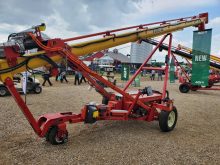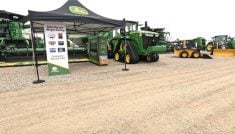The drone market is evolving quickly, and service providers are trying to keep up.
PhiBer took a big swing at the future market with its Dash Carrier to support four drones, and it resulted in winning the ag tech category in the innovation program at Ag in Motion 2025.
Drones are seeing greater use in agriculture to apply seed, fertilizer and pesticides. Ground sprayer wheels can damage crops and are increasingly expensive, making the cheaper drone attractive.
Follow all our Ag in Motion coverage here
Read Also

Trump’s tariffs take their toll on U.S. producers
U.S. farmers say Trump’s tariffs have been devastating for growers in that country.
The challenge for drones is competing on efficiency, and technology is rapidly evolving to support that goal, including PhiBer’s drone carrier.
PhiBer is known for its support tenders for sprayers and was able to use that expertise to create a similar support carrier for drones. However, Steve Froese, sales manager for PhiBer, says there are many differences between the drone and ground sprayer carriers.
“Fundamentally, this system is built to land drones on the top where the Dash carrier is simply a large ground sprayer service system,” he said at Ag in Motion, where curious farmers scoured the trailer, which is one of the first to be built specifically for drones.
The bright orange trailer is designed to be a self-contained unit. Hot tanks for mixing sit in the middle of the trailer, in front of a large water tank. On the back of the trailer is a 70 kw generator that helps quickly charge drone batteries.
Froese says 70 kw is likely more than is needed for today’s drones, but as drones get larger and battery technology evolves, it will likely be needed.
The action takes place on the roof of the trailer. The top folds out to provide a landing platform for four drones, charging stations, anchors for the drones for transportation, a hose to fill the drone with whatever liquid is needed and a reel and water hose for cleaning.
At the front of the upper platform is a turret that raises for use and lowers for transportation where operators can sit and control the drone operations.
There are two seats, and Froese says that two operators could be needed if the trailer were being used to its full capacity.
“You will be allowed to land four drones at one time if you want to, but loading and changing batteries, you’re probably going to need a little bit of time between drones,” says Froese.
The carrier is self-levelling, and the setup process can be controlled with the company’s phone app.
The trailer is about 13-feet tall when the landing areas are folded up over the drones and it’s ready for transport.
PhiBer is designing a two-drone service trailer.
Froese says the four-drone trailer is expensive, but for drone operators looking for a way to increase their efficiency, it’s an option. The company has sold six as of mid July.
















